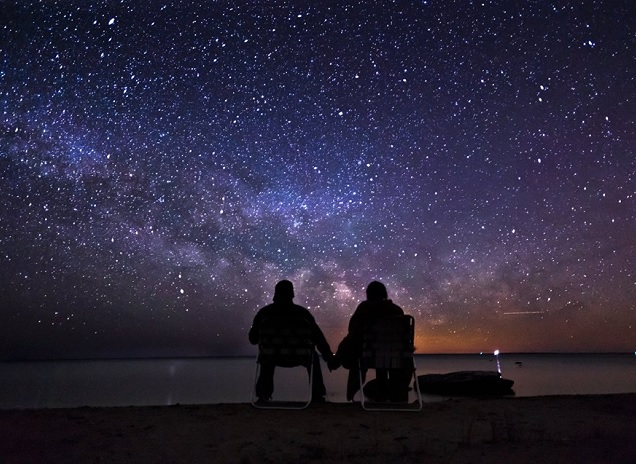Astrotourism is a growing trend, and with three state dark sky parks nearby, the Alpena area is an ideal destination for enjoying the cosmos. Rockport State Recreation Area, Thompson’s Harbor State Park, and Negwegon State Park all have sufficiently low enough levels of light pollution to be designated as dark sky parks – offering exceptional viewing of the celestial bodies and phenomena of the nighttime sky.
The Perseid meteor shower is about to make another grand entrance into our night sky and you will not want to miss this one! This annual occurrence takes place between the dates of July 17th-August 24th, with peak viewing usually around August 11th and 12th. The Perseid meteor shower is always a brilliant cosmic event, with anywhere from 80-200 meteors occurring in an hour. This year the full moon will brighten the night sky, however, we are still hoping for a good show!
What brings on the Perseid meteor shower year after year? Every year we pass through a patch of comet dust from the remnants of Comet Swift-Tuttle, left behind in its orbit around the sun in the year 1862, 1479, and 1079. We are literally watching ancient comet dust blast through our atmosphere and light up the night sky! How did the Perseids get their name? The Perseids are named such due to the point from which they appear to fall from, known as the radiant in the constellation of Perseus. Bringing forth Perseids, meaning “son of Perseus” in Greek mythology.
Luckily for us, we have 3 nationally recognized dark sky preserves in the Alpena area for a premium viewing experience so you can pick which one is closest to you to watch this cosmic event. Thompson’s Harbor State Park, Negwegon State Park, and Rockport State Recreation Area are the places to be on August 12th, the peak night of the Perseid meteor showers.

You can find our Dark Sky adventure guides at the Visitor Center at 420 N. 2nd Ave.
Don’t forget to make sure your car license plate has the Recreation Passport “P” on it in order to enter the park. If not, passports will be available at the park entrance.
Fun Facts: What’s the difference?
Meteor– a small body of matter from outer space that enters the Earth’s atmosphere, becoming incandescent as a result of friction, appearing as a streak of light.
Meteorite– a meteor that survives passage through the Earth’s atmosphere such that part of it hits the ground.
Meteoroid– a small body moving in the solar system that would become a meteor if it enters Earth’s atmosphere.






 420 N. 2nd Ave. Alpena, MI 49707
420 N. 2nd Ave. Alpena, MI 49707 989-340-2288
989-340-2288 